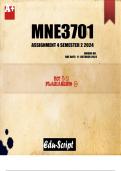MNE3701
ASSIGNMENT 4 SEMESTER 2 2024
UNIQUE NO.
DUE DATE: 11 OCTOBER 2024
, Question 1
Application of a Pricing System in a Café Business
Pricing is a critical component of the marketing mix, directly influencing a business’s
profitability and market positioning. In the context of a café business, implementing an
effective pricing system involves strategic consideration of various factors, including
costs, competition, customer perception, and market demand. This essay critically
discusses the application of a pricing system in a café, utilizing practical examples to
illustrate key concepts and strategies.
Cost-Based Pricing
One fundamental approach to pricing is cost-based pricing, which involves setting
prices based on the total cost of production plus a desired profit margin (Kotler & Keller,
2016). For a café, this entails calculating the cost of ingredients, labor, rent, utilities, and
other overheads. For instance, if the total cost to produce a cup of specialty coffee is £2,
and the café aims for a 50% profit margin, the selling price would be set at £3. This
method ensures that all costs are covered and a consistent profit margin is maintained.
However, it may not always reflect the market conditions or customer willingness to pay,
potentially leading to prices that are either too high or too low relative to competitors.
Value-Based Pricing
Contrastingly, value-based pricing focuses on the perceived value to the customer
rather than solely on costs (Nagle, Hogan & Zale, 2016). In a café setting, this approach
considers factors such as the quality of coffee, ambiance, customer service, and unique
offerings like organic or fair-trade products. For example, if customers perceive the café
as offering a superior experience, they may be willing to pay a premium price. This
strategy can enhance profitability and brand positioning but requires a deep




